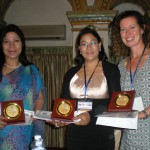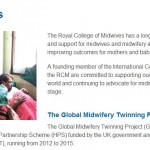Last night (March 16th 2015) Bournemouth University Professor Edwin van Teijlingen attended a reception and panel discussion on Midwives as agents for change organised in London by the Ambassador of Sweden Ms. Nicola Clase. Earlier this year the Swedish Ministry of Foreign Affairs launched midwives4all, which an initiative to spread the knowledge about the benefits of evidence-based midwifery, working closely with contributors to The Lancet’s series on midwifery.1
 With the Millennium Development Goals (MDGs) coming to an end in 2015, it is clear that despite great improvements many countries have not reached two key targets: MDG4 to ‘reduce child mortality’ and MDG 5 to ‘improve maternal health’.2 Too many women today still die in childbirth, most of these deaths occur in low-income countries and most of these deaths are avoidable. In 2013 alone, 289 000 women died from childbirth complications. Nearly 3 million newborns die in the first month of life and 2.6 million newborns are stillborn each year.
With the Millennium Development Goals (MDGs) coming to an end in 2015, it is clear that despite great improvements many countries have not reached two key targets: MDG4 to ‘reduce child mortality’ and MDG 5 to ‘improve maternal health’.2 Too many women today still die in childbirth, most of these deaths occur in low-income countries and most of these deaths are avoidable. In 2013 alone, 289 000 women died from childbirth complications. Nearly 3 million newborns die in the first month of life and 2.6 million newborns are stillborn each year.
The aim of midwives4all is to use a coordinated and innovative communication approach to highlight the need to implement universal practice of midwifery globally in order to improve maternal health and empower women. Midwives4all highlights that only 22 per cent of countries have potentially enough midwives to provide life-saving interventions to meet the needs of women and newborns, which leaves most countries with severe shortages of proper maternity care. The vast majority of women and children lose their lives due to complications and illnesses that could have been prevented. Scaling up the midwifery workforce could prevent about two-thirds of maternal and newborn deaths, saving millions of lives every year.
For some countries the first step is to ensure that midwifery is properly recognised in law. In Nepal, one of the country in which we conduct research, midwifery is not yet officially recognised as an independent profession.3 Together with the president of MIDSON and Swedish colleagues we have long argued that we urgently need to convince the Government of Nepal and other the relevant stakeholders that ‘Nepal needs midwifery’.4
Prof. Edwin van Teijlingen
CMMPH
References:
- The Lancet Midwifery Series: http://www.thelancet.com/series/midwifery
- van Teijlingen, E., Hundley, V., Matthews, Z., Lewis, G., Graham, W.J., Campbell, J., ten Hoope-Bender, P., Sheppard, Z.A., Hulton, L. (2014) Millennium Development Goals: All good things must come to an end, so what next? Midwifery 30: 1-2.
- Bogren, M., van Teijlingen, E., Berg. M. (2013) Where midwives are not yet recognised: A feasibility study of professional midwives in Nepal, Midwifery 29(10): 1103-1109.
- Bogren, M.U., Bajracharya, K., Berg, M., Erlandsson, K., Ireland, J., Simkhada, P., van Teijlingen, E. (2013) Nepal needs midwifery, Journal of Manmohan Memorial Institute of Health Sciences (JMMIHS) 1(2): 41-44. www.nepjol.info/index.php/JMMIHS/article/view/9907/8082
 BU presents at first National Midwifery Conference in Nepal
BU presents at first National Midwifery Conference in Nepal International Day of the Midwife, Edinburgh 2015
International Day of the Midwife, Edinburgh 2015










 SPROUT: From Sustainable Research to Sustainable Research Lives
SPROUT: From Sustainable Research to Sustainable Research Lives BRIAN upgrade and new look
BRIAN upgrade and new look Seeing the fruits of your labour in Bangladesh
Seeing the fruits of your labour in Bangladesh Exploring Embodied Research: Body Map Storytelling Workshop & Research Seminar
Exploring Embodied Research: Body Map Storytelling Workshop & Research Seminar Marking a Milestone: The Swash Channel Wreck Book Launch
Marking a Milestone: The Swash Channel Wreck Book Launch ECR Funding Open Call: Research Culture & Community Grant – Application Deadline Friday 12 December
ECR Funding Open Call: Research Culture & Community Grant – Application Deadline Friday 12 December MSCA Postdoctoral Fellowships 2025 Call
MSCA Postdoctoral Fellowships 2025 Call ERC Advanced Grant 2025 Webinar
ERC Advanced Grant 2025 Webinar Update on UKRO services
Update on UKRO services European research project exploring use of ‘virtual twins’ to better manage metabolic associated fatty liver disease
European research project exploring use of ‘virtual twins’ to better manage metabolic associated fatty liver disease